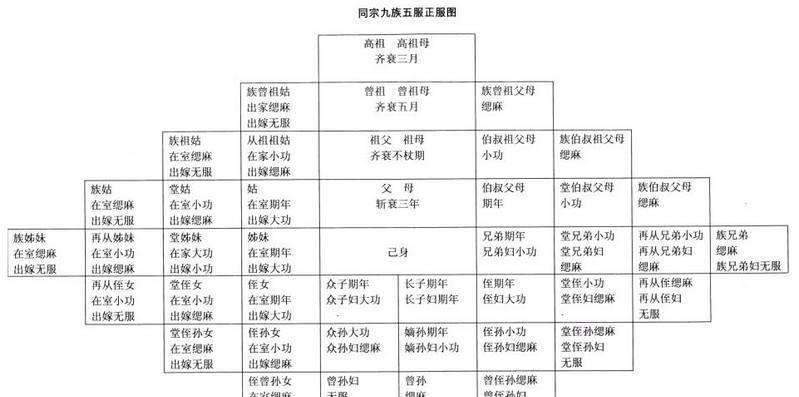There is a saying in The Jiaodong Peninsula of Shandong Province that "within the five services is a relative", which means that within the five services is a relative. Outside of the five services, they are not relatives, and they are called out of the service, and they are also called out of the five clothes. It is worth mentioning that many people now think that five services are five generations, which is wrong, five generations are counted as one service, and five generations are twenty-five generations. Moreover, "five clothes" in ancient times also had more than one meaning.

There are four main meanings of five suits. The first is a way that the ancients divided the territory of the five hundred miles for a district centered on the king, and the subjects belonged to different regions and paid different taxes. The areas of five hundred miles around tianzi are called Dianfu, and the area closest to the royal city pays grain with straw; the area outside it pays the grain; the area outside it pays the grain; the area one hundred miles outside pays the grass spike; the area one hundred miles outside pays the grass spike that removes the grass; the area after it pays the grain with the shell; and the farthest hundred miles pays the shellless rice.
The area five hundred miles away from Dianfu is called Houfu, and the area closest to Dianfu is the place where the Emperor Qingfu is the place where the Emperor Qing dafu is, followed by the domain of the baron, and the last three hundred miles is the domain of the princes of the feudal kingdom. The five hundred miles outside the Houfu were called Suifu, and the area closest to the Houfu was three hundred miles, and the imperial court would carry out culture and education according to the situation of the people, and the remaining two hundred miles were to revitalize the armed forces to show military strength. The five hundred miles outside the appeasement are to be served, the three hundred miles near the appeasement are where the Yi people live, and the remaining two hundred miles are the places where sinners are exiled, and the service belongs to the more remote areas. The last one is the deserted garment, and the area three hundred miles near the service is the barbaric zone, and the rest is also the place where the prisoners are exiled.
The second meaning of the five services is a way used by the ancients to divide the ranks, mainly divided into tianzi, princes, secretaries, doctors, scholars and other five-class clothing styles. The third meaning refers to the five generations of grandfather, great-grandfather, grandfather, father, and oneself. The last is the five kinds of mourning clothes in ancient times, which are divided into the following types according to the different periods of mourning and the thickness of the mourning clothes:
Beheading, the most important mourning garment of the five. The coarsest raw linen cloth is made into a mourning garment, and the broken part is exposed without a border, which is often referred to as raw edge. The tunic of the mourning dress is called "decay", so there is "decay". In ancient times, princes were the son of heaven, subjects were kings, men and unmarried daughters were parents, daughters-in-law to in-laws, heavy-bearing grandchildren to grandparents, and wives to husbands were to wear and decay when they were mourned. Expressing unadorned grief, the serving period is three years.
Qi decay, a mourning garment inferior to that of decay, is made of burlap cloth. Wherever the mourning garment is cut, the hem can be closed, and the hem is smashed on the edge. It is a mourning dress worn by grandchildren for grandparents, great-grandchildren and great-granddaughters for great-grandfathers, great-grandmothers, and for grandchildren and grandmothers.
Dagong, also known as Dahong, is made of coarsely cooked linen cloth, and the material is slightly thinner than Qi. It is the mourning garment worn by the people for their uncles and parents, for cousins, cousins who have not yet left the cabinet, aunts and sisters who have married, and married daughters who have served their mothers, uncles, and brothers for a period of nine months.
Xiao Gong, also known as Shang Hong, is made from a finer cooked linen cloth. During the Qing Dynasty, it was worn by the people for grandparents, cousins, unmarried grandparents, cousins, married cousins, brothers' wives, cousins, unmarried cousins, and for the mourning of maternal grandparents, maternal uncles, maternal aunts, etc., and the service period was five months.
Hemp, is the lightest of the five clothes, the material for making mourning clothes is thinner than xiaogong, most of them are made of bleached cloth, so it is also called "drifting filial piety". It is a mourning garment worn by a man for the great-grandparents, clan grandparents, clan parents, clan brothers, and for grandchildren, nephews, sons-in-law, wife's parents, cousins, aunts, etc., and the service period is three months.
In addition to the five services, the relatives of the same fifth ancestor are "exempt from relatives", that is, "plain clothes". 蓷 refers to the need for people to show their left arm, which means that the cloth is handed forward from the neck to the forehead, and then wrapped around the bun. For the funeral of a friend, in the spiritual hall or funeral, not only to do the first two, but also to wear hemp. If you are in the field, you only need to be exempted.
China has always been a country of etiquette, so in many aspects of ancient times, there were strict regulations, and some traditional etiquette also needs to be passed on to future generations.